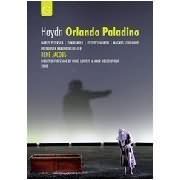As usual with this subject matter, Orlando is the knight nobly torn between love and war, and Alcina is theoretically an evil sorceress. Orlando goes crazy and senseless when he discovers that his love, Angelica, has eloped with Medoro. The only way the plot can be resolved so that Angelica (who loves having men in love with her) and Medoro (who is so lovesick and scared that he’s half comatose) can be happy is for Alcina to give Orlando bad dreams, turn him to stone, lock him in a cave, and finally, drug him with Lethe’s waters so that he forgets Angelica.
Add to this the pagan King Rodomonte, who also loves Angelica and is in a constant rage and wants to tear Orlando to shreds; a shepherdess named Eurillia who assists Rodomonte; and Orlando’s blabbermouth squire, Pasquale, who is always hungry and flirts with Eurilla first for food and then for real, and you get a scenario in which nobody except Orlando takes anything very seriously. Indeed, he deserves to be shut away and have his mind altered. And in the meantime, there are scenes of wrath, jealousy, love, boasting, hunger, and battle–and all of it’s for sheer entertainment.
This dramma eroicomico (heroic comedy), as Haydn called it, takes three hours and contains more than 50 musical numbers (including one from Il mondo della luna that René Jacobs has added for Alcina where a showpiece should be, near the end of the opera). The staging is wacky in the extreme. The back of the set by Nigel Lowery slides to portray different things, and many of these are cartoon-like: bunches of fake Christmas trees, an enormous pair of scissors, a severed arm, a leg. His costumes are modern, some military, some as shepherds (also somewhat military)–and Rodomonte is dresssed as a pirate. The characters wave their arms a great deal, a couple twitch uncontrollably except when they are not singing, at which point they seem as if they’ve fallen into a trance.
I’m pretty certain that choreographer/director Amir Hosseinpour’s notion is of a mental institution and that everyone here is delusory. Whatever, it’s more fun than you’d think–and how seriously are we supposed to take the plot anyway? The scissors, I believe, are what Alcina uses to “cut away” Orlando’s memory. Some observers may find the entire production garish and foolish, but it is no more artificial than what Haydn was presenting–a zany entertainment.
The singing and involvement are marvelous. Best are the two comic characters, Eurilla (Im) and Pasquale (Torres), who have complicated vocal lines and are asked to behave as ridiculously as possible while executing rapid coloratura, long lines, and, in Torres’ case, some silly falsetto singing (in “Ecco spiano, ecco il mio trillo”). Tom Randle, as Orlando, has surprisingly little to do–he’s almost a minor character–but his warm, low tenor ideally expresses the character’s mania, sad situation, and humor. Running around wielding an axe, however, does not help make him any more or less sympathetic.
Marlis Petersen as Angelica, dressed as an untidy princess in black, sings angelically; her flights of coloratura are a sure sign of a troubled mind. Her second-act aria–with a pair of oboes that seem to be mocking her–is a showstopper. Magnus Staveland, another fine tenor, is an elegant Medoro; Pietro Spagnoli’s Rodomonte–eye-patch, crutch, and all–is entertaining. Alexandrina Pendatchanska’s Alcina takes the breath away; oddly, like Orlando, her role is small until near the opera’s close. She’s a terrific actor and sings like a demon.
The Freiburg Baroque Orchestra, as expected, is superb under René Jacobs’ careful and loving direction, with spicy woodwinds and exciting string playing. They seem to be having a grand time, with the continuo players commenting throughout. This is probably the finest performance of this opera we’ll ever see, but bear in mind that it is still a very long evening, and some of the absurdity and lack of true dramatic substance wears thin enough to make your mind wander. Blasphemy, perhaps, but there you have it. (Picture and sound are superb; subtitles are clear and well-translated.)
































